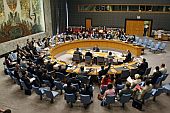 | « Back to article | Print this article |
 India is lobbying hard for a non-permanent seat to the UN Security Council, when the Asia seat comes up for renewal at the end of next year, hoping to end a drought that would have lasted 18 years by the time elections are held in October 2010.
India is lobbying hard for a non-permanent seat to the UN Security Council, when the Asia seat comes up for renewal at the end of next year, hoping to end a drought that would have lasted 18 years by the time elections are held in October 2010.
India's main rival for the Asia seat is Kazakhstan, which has never won a seat to the Security Council. India has already been elected six times, the last time as long ago in 1991-92, when the world was a completely different place.
The last time India sat on the Council, the Soviet Union was still a country and the first US invasion of Iraq was a taste of things to come in the new world order. As a non-permanent member at the time, India had little choice but to go along with the Security Council resolution sanctioning the Iraq invasion.
The Security Council consists of five veto-wielding permanent members -- US, Russia, China, UK and France -- and 10 non-permanent members, not allowed a veto but elected for two-year terms, from regions like Asia, Africa, eastern Europe, Latin America and the Caribbean, and western Europe.
An Indian win against Kazakhstan is also aimed at wiping out the nightmare of 1996, when India fought a hugely unequal contest against Japan for the Asian seat and was trounced 142-40, in favour of Japan.
Japan, the second highest donor to the UN and currently on the Security Council again, holds the honour of representing Asia as many as 10 times.
The Ministry of External Affairs (MEA), which had projected a huge victory for India in 1996, was stunned at the scale of its defeat. Today, more than 13 years later, with the campaign well underway for the last several months -- and with a full year to go -- it appears far more confident, but cautious.
Of the 192 voting countries in the UN General Assembly, Indian officials who spoke on the condition of anonymity said they had already got the support of "more than 100 countries."
The hope exists that Kazakhstan will withdraw its candidature when faced with overwhelming support for India, but clearly, no one's taking any chances. The upcoming UN General Assembly session will be used to lobby hard, underlining requests already made by Indian ambassadors worldwide, as well as by the prime minister and the external affairs minister to visiting dignitaries.
As many as three out of five permanent members, including Russia and France, are believed to have committed support to India.
Still, there remains a certain uncertainty over whether India should be expending its "political capital" over a non-permanent seat that has been variously described as a "toothless, anachronistic, archaic wonder," left over from the Cold War era.
Perhaps, part of the reason to go ahead with the contest two years ago was the realisation that the expansion of the UN Security Council was still some years away, and that the Permanent Five were never going to dilute their own veto power by sharing it. Then when (now minister of state for external affairs) Shashi Tharoor lost the race to UN Secretary-General in 2006, Delhi's dream of being at the helm of global affairs died quickly.
A large section of the political-security establishment believes that India shouldn't even bother. This "realist" school, which seeks to further India's national interest by cultivating friendships with big powers like the US, is dismissive about the "multi-lateral" school, which seeks to make friends irrespective of the influence nations wield.
The BJP-led NDA governments (1998-2004), which took the decision to go nuclear in 1998, clearly believed in following a muscular approach to India's foreign policy. But the Congress-led UPA alliances have followed suit, sewing up the Indo-US deal with alacrity in the face of pressure from the Left parties and the BJP.